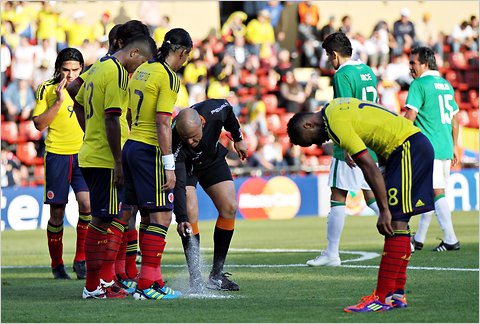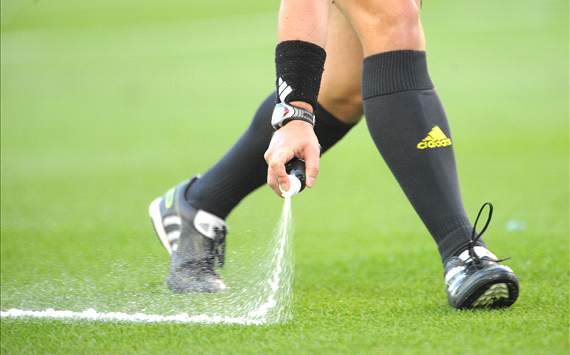By David Gold
June 6 – The much talked about aerosol spray used to draw lines on a football pitch when giving a free-kick is being used during the current round of South American qualifiers for the Brazil 2014 World Cup, the continental confederation (CONMEBOL) has confirmed.
Last weekend South American teams played the fifth round of fixtures in qualifying for the next World Cup, with Argentina currently top of the standings – after taking 10 points from five games – closely followed by Chile, Uruguay and Venezuela.
The Argentines beat Ecuador 4-0 last weekend, while Chile beat Bolivia 2-0, Uruguay and Venezuela drew 1-1 and Colombia beat Peru 1-0.
There is another round of qualifiers this coming weekend, and in both rounds the spray is being used following a recent meeting of CONMEBOL at the FIFA Congress in Budapest, Hungary.
Referees are being provided with the spray – invented by Pablo Silva, an amateur footballer and journalist, who created it after becoming frustrated by encroaching walls at free kicks – in their locker rooms as standard procedure.
The team defending a free kick must not have any players fewer than 10 yards behind the ball before it is kicked.
In practice almost every team seeks to gain an advantage by creeping forward at set pieces, and the spray is seen as an antidote to that.
The aerosol allows referees to spray-paint a temporary white line onto the field to mark where the defending team must stand behind.

It has since been trialled and used in Argentine league football since 2008 and has also been used in other competitions in South America.
Both continental club competitions, the Copa Libertadores – South America’s version of the Champions League – and the Copa Sudamericana, have used the spray.
It was also used at last year’s Copa America in Argentina, which was the first time the spray was utilised for national team games.
CONMEBOL were given the green light to use the spray in the World Cup qualifiers when the International Football Association Board (IFAB) approved its use at a meeting in Bagshot, England, earlier this year.
Contact the writer of this story at zib.l1742327478labto1742327478ofdlr1742327478owedi1742327478sni@d1742327478log.d1742327478ivad1742327478

